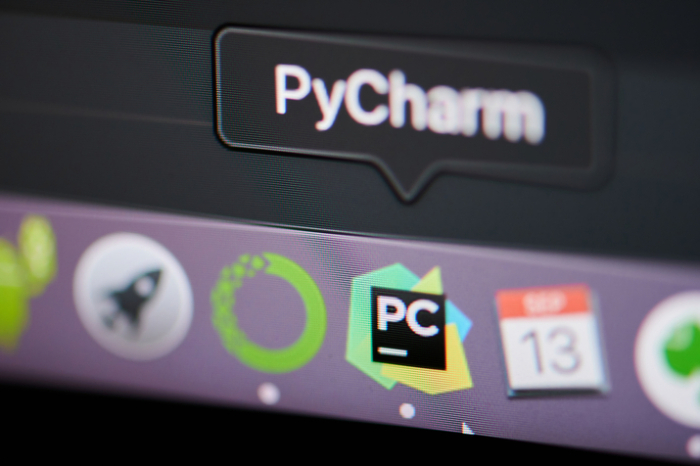
 Data Structure
Data Structure Networking
Networking RDBMS
RDBMS Operating System
Operating System Java
Java MS Excel
MS Excel iOS
iOS HTML
HTML CSS
CSS Android
Android Python
Python C Programming
C Programming C++
C++ C#
C# MongoDB
MongoDB MySQL
MySQL Javascript
Javascript PHP
PHP
- Selected Reading
- UPSC IAS Exams Notes
- Developer's Best Practices
- Questions and Answers
- Effective Resume Writing
- HR Interview Questions
- Computer Glossary
- Who is Who
Should I use PyCharm for Programming in Python?
Python is a widely used programming language known for its simplicity, versatility, and a large community of developers. This community constantly creates new libraries and tools to enhance the efficiency and convenience of programming in Python. Choosing the right environment for writing and debugging Python code can be challenging, but PyCharm is an excellent option that stands out from the rest.
The following article will delve into whether or not PyCharm is the right choice for your Python programming.
What is PyCharm?
PyCharm is an Integrated Development Environment (IDE) specifically designed for the Python language. It is designed to make coding faster and easier for programmers by providing a range of tools and modules. An IDE is a software application that provides a comprehensive environment for software development, including editing, debugging, and compiling code.

One of the reasons for PyCharm's popularity is the credentials of its developer, Jetbrains. JetBrains is a Czech company that is well-known for creating some of the most popular IDEs for Java and Javascript.
PyCharm offers support for both Python 2 (2.7) and Python 3 (3.5 and above) versions, which means that it can be used for projects that are written in either version of the language. Additionally, it can be used on a multitude of platforms including Windows, Linux, and macOS.
The Capabilities of PyCharm as an IDE
PyCharm is a versatile tool for Python development, which can be used for various tasks such as code analysis, debugging, and testing. Additionally, it is particularly useful for web development using popular web application frameworks like Django and Flask. Furthermore, programmers can also create their Python plugins using various APIs.
PyCharm also offers the ability to access different databases without the need for additional tools. Despite being specifically designed for Python programming, it can also be used to create HTML, CSS, and Javascript files. Additionally, it boasts a user-friendly interface that can be customized using plugins for specific applications.
Integration Tools
PyCharm is an integrated development environment (IDE) for Python development and it provides a wide range of integration tools that allow you to work with various other technologies and tools. Some of the key integration tools that PyCharm offers include ?
Scientific tools integration - PyCharm has integration for popular scientific tools like Matplotlib, NumPy, and SciPy, allowing you to easily visualize and analyze data.
Remote development - PyCharm allows you to develop and debug code running on remote machines, virtual machines, and containers.
Plugins and third-party tools integration - PyCharm has a rich plugin ecosystem that allows you to integrate with various third-party tools and services, such as Jupyter Notebook, Anaconda, and more.
Overall, PyCharm's integration tools allow you to work with a wide range of technologies and tools, and make it easy to develop, test, and deploy Python applications.
Features of Pycharm
PyCharm is a powerful and feature-rich Integrated Development Environment (IDE) for Python development. Some of the key features of PyCharm include ?
Intelligent code completion ? PyCharm suggests possible code snippets as you type, making it faster and easier to write your code.
Debugging ? PyCharm includes a built-in debugger that allows you to step through your code, set breakpoints, and inspect variables, making it easier to find and fix bugs in your code.
Code navigation ? PyCharm allows you to quickly navigate through your codebase, including the ability to jump to a specific class, method, or file.
Code refactoring ? PyCharm includes a set of code refactoring tools that make it easy to improve the structure and quality of your code.
Integrated testing ? PyCharm includes support for running and debugging unit tests, making it easy to test your code and ensure that it is working correctly.
Version control integration ? PyCharm supports a wide range of version control systems, such as Git, Mercurial, and SVN, making it easy to work with code that is stored in a version control repository.
Database integration ? PyCharm allows you to connect to various databases and work with them directly from the IDE, including popular databases like MySQL, PostgreSQL, and Oracle.
Web development frameworks integration ? PyCharm supports popular web development frameworks such as Django, Flask, and Pyramid, allowing you to easily create web applications with Python.
Customizable UI ? PyCharm allows you to customize the look and feel of the IDE to suit your preferences, including the ability to change the color scheme, font, and layout of the interface.
Overall, PyCharm's feature-rich environment allows developers to efficiently write, test, and debug Python code, as well as collaborate and integrate with other technologies.
Conclusion
In conclusion, PyCharm is a powerful and popular IDE for programming in Python. It offers many features such as code completion, debugging, and refactoring, which can make development quicker and more efficient. However, whether or not you should use it depends on your specific needs and preferences. If you are new to programming or prefer a simple text editor, you may want to start with a more basic tool. But if you are working on a large project or need advanced features, PyCharm may be the best choice for you. Ultimately, it's worth trying out different options to see which one works best for you.

